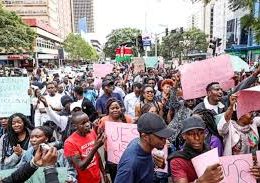By Daniel Waldron
On 13 September, over 100,000 joined an anti-immigration ‘Unite the Kingdom’ rally in London, called by the far-right grifter known as Tommy Robinson, which dripped with overt racism. The crowd was addressed by an odious line-up of speakers, including broligarch Elon Musk. A Palestinian flag was torn in half on stage, and some participants marched with Israeli flags, underlining the event’s deeply reactionary character.
This is potentially the largest far-right demonstration in British history. The size of the march – and the fact it massively outnumbered the Stand Up to Racism counter-protest – will further embolden racist and fascist thugs who pose a physical threat to people of colour, immigrants, the LGBTQ+ community, women and the left. Meanwhile, Nigel Farage’s Reform is currently topping the polls and could form the next government. As we know, unfortunately, the growth of racism and the far right is not isolated to Britain, but is reflected across much of ‘the West’, with Trump’s administration acting as a figurehead.
Disgusting and racist arguments
In Ireland, North and South, far right and fascist groups are trying to gain support by organising in opposition to immigration and the housing of refugees – people fleeing war and persecution. Like their counterparts in Britain, they are trading on racist tropes about ‘unvetted’ males from abroad posing a threat to women and children. These same defenders of ‘our women and children’ are, of course, silent about gender-based violence when the perpetrator is local and white. It’s no surprise that a third of those arrested in connection with the racist riots in Ballymena in June this year had a record of domestic abuse. The horrific attempted lynching at Connswater in east Belfast sums up the danger posed by the racist thugs at the core of this movement.
Racism and the concept of white supremacy are deeply embedded within capitalist society, particularly in the imperialist, former colonial powers. Historically, it acted as the ideological justification for colonisation, oppression, robbery and enslavement. It is also a tool used by the rich to divide workers and the poor, to maintain their position and allow them to better exploit us.
With their system in crisis and the old neoliberal order breaking down, the ruling class’s ‘democratic and liberal’ mask is slipping. They are shifting in an increasingly authoritarian and reactionary direction. Establishment parties themselves are embracing the policies and language of the far right, partly in a vain attempt to cut across the electoral threat they face from insurgent far-right forces. This was reflected in Keir Starmer’s ‘island of strangers’ speech which evoked the memory of Enoch Powell.
Divide and rule
As well as tapping into the racism already built into capitalist society, the far right are feeding off the justified anger of many working-class people over the crises in healthcare and education, the cost of living, the lack of affordable housing, and myriad other real problems which are rooted in the profit-driven system of capitalism. Instead of directing this anger against the billionaires, bosses and bankers, the far right serve the system by turning this anger against migrants, trans people and other marginalised groups. They are aided in this by the political vacuum on the left and the inertia of the trade unions, whose conservative leaders have failed to stand up for the interests of working people.
The threat from the far right is serious, but it can be challenged. Over the recent period, we have seen huge demonstrations in both Britain and Ireland against racism, in opposition to the genocide in Gaza, and in defence of trans rights. While farcical developments at the top have been damaging, the fact that over 800,000 people signed up to the new left party launched by Jeremy Corbyn and Zarah Sultana is extremely significant. The potential of this project must be salvaged. These developments reflect the social forces which can push the far right back, if they can be cohered into mass organisations that give confidence and direction, with people of colour and migrant communities playing a central role.
The far right must be challenged head on, organising physical defence against fascist thugs, as well as mass mobilisations when they take to the streets. This cannot be done in a lightminded way, given the violent nature of our enemies. Hand in hand with this, the far right – and the capitalist establishment – also have to be challenged politically. That means exposing racism and the far right as weapons of the ruling class, and offering real solutions to the problems facing ordinary people. We need to refocus people’s anger on those who are really robbing them – the profit-hungry bosses and landlords and their political representatives, including the likes of Farage – and build support for a movement which will take power and wealth out of their hands.












